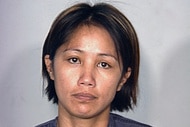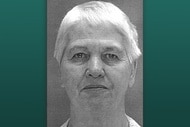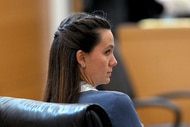Create a free profile to get unlimited access to exclusive videos, breaking news, sweepstakes, and more!
Prosecutors Allege Alex Murdaugh Killed His Wife And Son To Prevent 'Personal, Legal And Financial Ruin'
Prosecutors believe mounting financial pressures and stress created the "perfect storm," causing Alex Murdaugh to shoot his wife Maggie and son Paul to divert attention from his own activities.

Prosecutors allege disgraced former South Carolina attorney Alex Murdaugh gunned down his wife and son in an attempt to stave off his own “personal, legal and financial ruin,” according to new court documents in the case.
The South Carolina Attorney General’s Office argued in a motion, filed Thursday and obtained by Oxygen.com, that Murdaugh was the “only individual with a true motive to kill his wife and son,” and fatally shot both on the evening of June 7, 2021 to cover up years of alleged financial crimes and fraud that were about to come to light.
“Ultimately, the murders served as Murdaugh’s means to shift the focus away from himself and buy himself some additional time to try and prevent his financial crimes from being uncovered, which—if revealed—would have resulted in personal, legal, and financial ruin for Murdaugh,” Senior Assistant Deputy Attorney General Creighton Waters wrote.
For the first time, the motion lays out in detail the alleged motive in the case — and the mounting pressure prosecutors say Murdaugh was facing on multiple fronts — leading up to the grisly double murders.
Murdaugh has pleaded not guilty in the case.
The motion requests that Circuit Judge Clifton Newman allow evidence of the financial crimes to be admitted as evidence in Murdaugh’s upcoming trial, slated to begin next month, arguing that the financial dealings are central to understanding why a man would choose to murder his own family.
“The jury will need to understand the distinction between who Alex Murdaugh appeared to be to the outside world — a successful lawyer and scion of the most prominent family in the region — and who he was in the real life only he fully knew — an allegedly crooked lawyer and drug user who borrowed and stole whatever he could to stay afloat and one step ahead of detection,” Waters wrote. “Proof of years of Alex Murdaugh’s unbroken series of misappropriation, lies, loans, debts and thefts is necessary to explain that distinction to a jury.”
Waters alleged that on the night of June 7, 2021, the “perfect storm” had been brewing which threatened to “expose the real Alex Murdaugh to the world” and would force him to face “real accountability for his life.”
While Murdaugh came from a family of “prominence and respect” in South Carolina’s low country, prosecutors say his personal finances began to crumble after “a series of bad land deals exacerbated by the recession” that “permanently changed his finances.”
To maintain his lavish lifestyle, prosecutors said Murdaugh began to borrow money from “anyone who would lend him money,” including his family and law partners at Peters, Murdaugh, Parker, Eltzroth & Detrick, P.A. (PMPED).
It wasn’t enough, however, to fund the lifestyle he had grown accustomed to and authorities allege that Murdaugh began to “allegedly steal millions from clients, his firm, and his family in order to keep his head above water.”
Waters laid out four primary ways that prosecutors believe that Murdaugh stole money over the years. First, they alleged that Murdaugh billed personal expenses to his clients or his firm. Second, prosecutors allege he stole money from his own family and firm, once taking a six-figure loan repayment check that he knew had been issued to him in error and then claiming he lost the check. After receiving and cashing the new check, Murdaugh also cashed the original check, according to the court documents.
Murdaugh also allegedly stole money from his clients by setting up client disbursement checks to be made out to “Palmetto State Bank.” Murdaugh then had his friend and bank executive Russell Laffitte—who was found guilty last month of bank and wire fraud charges— convert those checks for his own personal use.
Finally, prosecutors allege Murdaugh stole money from his clients by setting up a “fake Forge” account at Bank of America in 2015, known as “Richard A Murdaugh d/b/a Forge.” Prosecutors said the law firm already used a legitimate company known as Forge Consulting LLC to help with client disbursements, so that when they saw checks being made out to “Forge” it did not attract attention, even though the money was secretly being funneled into Murdaugh’s fake account, according to the motion.
Despite the allegedly stolen funds, money he borrowed from others and his own lofty salary from the law firm, Waters contends that it “still was not enough to stop the incessant financial roller coaster on which Defendant put himself.”
According to the motion, his financial woes only deepened in February of 2019 when his son Paul was involved in a boat crash that killed fellow teen Mallory Beach. Paul was not only facing criminal charges in connection to the crash, but prosecutors said Murdaugh was also the subject of a civil lawsuit filed by Beach’s family, potentially opening himself up to scrutiny of his finances.
In February of 2021, Murdaugh won a large case with fellow attorney Chris Wilson and received $792,000 in fees for his services. However, rather than send the money through the proper channels at his law firm, Waters alleged that Murdaugh convinced Wilson to write him a personal check for sum.
In May of 2021, Murdaugh’s law firm became suspicious after receiving an expense check from Wilson and realized they had not received the check for the fees.
“Their inquiries to Wilson’s office did not get to the bottom of the matter and they could not get a satisfactory answer from Defendant as to where these fees were,” Waters wrote in the motion.
On June 7, 2021, the day of the murders, Waters said a staffer at the law firm came into Murdaugh’s office “and demanded an answer that day” about the missing funds.
It was also just days away from a hearing in the Mallory Beach civil suit to discuss a motion from the family’s attorneys to compel Murdaugh to hand over information on his bank accounts, assets and finances.
Murdaugh left his office that day after learning his father, from whom he had also allegedly borrowed money, had fallen ill and had a “poor prognosis.”
Prosecutors allege that later that night, Murdaugh killed his wife and son in an attempt to stave off the mounting financial pressures.
“Immediately everything changed,” Waters wrote. “People immediately treated Defendant as the victim of an unspeakable tragedy. Everyone backed off of their inquiries and rallied around him. The PMPED partners and staff were no longer seeking immediate answers about the bypassed fees and stopped making inquiries. The hearing on the motion to compel was canceled and a personal recovery against Defendant in the civil case was in jeopardy as a practical matter. The day of reckoning vanished.”
In the initial aftermath after the shootings, Waters said that Murdaugh told the first officer who arrived on the scene about 30 seconds into their conversation that he believed the killer’s motive had stemmed from the February 2019 boat crash.
“In fact, Murdaugh expressed certainty and stated that he knew ‘that’s what it is,’” Waters wrote in the motion.
Prosecutors believe it was an attempt to divert attention away from himself while he tried to resolve his financial issues.
“In the time the aftermath of the murders gave him, (Murdaugh) set about trying to cover his tracks,” Waters said. “He borrowed money to cover enough of the bypassed fees so that Chris Wilson could send them to PMPED as if they were there all along.”
While Waters acknowledged his alleged plans “might have worked,” he said the issue came to a head once again in September of 2021 after someone at the law firm discovered the original check Wilson had allegedly written to Murdaugh and an investigation was launched.
Murdaugh agreed to resign on Sept. 3 after the firm confronted him about their suspicions, just one day before authorities say Murdaugh, once again, tried to divert attention away from his finances by orchestrating a botched suicide attempt.
“This case is unique in South Carolina history for many reasons,” Waters concluded the motion. “One of those is that exposing what happened to Maggie and Paul necessarily has its roots in a corruption that began years ago and festered until June 7.”
The prosecutors’ motion was filed Thursday in response to an earlier motion this week by Murdaugh’s defense attorneys, Richard Harpootlian and James Griffin.
The two requested the judge order the prosecution to supply their theory of motive as part of an antiquated legal strategy known as a “bill of particulars.”
As part of that motion, which was obtained by Oxygen.com, Murdaugh’s attorneys argued that investigators “immediately decided Alex was guilty, before anyone collected, investigated, or reviewed any evidence.” They also argued that while the state had provided 1.2 million pages of documents laying out Murdaugh’s alleged financial crimes, they had not previously laid out their suspected motive for the murders.
In addition to the murder charges against him, Murdaugh is facing more than 80 charges for allegedly defrauding clients, his law firm and friends of more than $8.7 million.



























